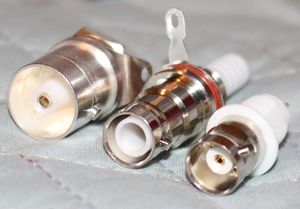Connectivity
This page explains connectors commonly used in the nuclear industry and why you'd want to use one vs the other.
Contents
Signal
Early equipment (ie NIM bins) primarily use BNC. Later equipment still uses BNC but some equipment (notably CAMAC) uses Lemo 00 connectors. Lemo connectors are much more expensive than BNC but are more compact and should provide a snugger fit.
Backplane
NIM
Nuclear Instrumentation Model (NIM) backplanes primarily focus on analog signals. The crate (chassis + power supply) provides some interconnect but primarily provides power and cooling. Instead, signasl are primarily patched through BNC connectors on the front of the module.
NIM's can use either TTL or ECL logic. My understanding is that generally TTL is less expensive but ECL is faster.
CAMAC
CAMAC focuses on digital electronics and computer control. It introduces a communications bus with a bus controller in the rightmost slot. The bus controller can be a standalone unit or provide PC connectivity through GPIB, RS-232, etc.
CAMAC primarily uses LEMO 00 connectors with occasional BNCs.
HV
Above: from left to right: C, SHV, BNC. Note extended insulation on SHV rear
Common connectors:
| Image | Name | Volt | Amp | Diameter | Weatherproof | Cost | |
|---|---|---|---|---|---|---|---|
| BNC | 500 | N | Low | ||||
| MHV | 5000 | N | |||||
| SHV | 5000 | N | Long ground sheath ensures center disconnects before ground | ||||
| UHF | 500 | ||||||
| C | 1500 | Larger | Y |
Notes:
- Ref cost: lowest cost bulkhead I could find at a quick search (2015-12). Primarily eBay
JM general reccomendations:
- Use BNC for low voltage probes (ex: GM tubes)
- Use SHV for high voltage probes (ex: He-3 tubes)
- Consider C if you need weatherproofing
- For 5-40 kV you can get some reasonably priced/sized connectors
- >40kV:
- Do you really need a (bulky/expensive) connector? Consider simple terminals
- If you insist, use x-ray connectors
x-ray
Vendors
- Claymount
- CA1 is the cylindrical three prong type
- CA22 is the booted type that I see sometimes
- Essex
- Dielectric services
- Classifies the Federal Standard as a medical connector and the conical as an industrial standard
Federal standard
Most common type I see. Three pin is most common, but also seen more (ex: on SEM). Retention / clamping ring style also seems to vary.
Claymount CA1
Sample equipment using this:
- Eureka
- GE
Conical
Claymount CA22
Essex
C connector
Primarily used on Ludlum detectors/meters.
- Doesn't have much info
- Indicates that white vs red center is 50 vs 75 ohm although doesn't say which is which
- I have only seen white centers
- 50 ohm (white)
- 75 ohm below 300 MHz
- 1500 volts peak, std
- 3000 VRMS
- Usually weatherproof
Notes from 2015-12
Found connectors under the following names. I haven't looked to formally figure out the differences
R390, R-390A
UG-568
- Bulkhead w/ 4 bolts
- Ex: Amphenol 082-504: UG-568/U, C-Type Straight Solder Jack, Panel Mount, 50 Ohm
UG-628A
- Ex: Apnhenol 082-532: RF Connector, UG-628A/U, C-Type Straight Clamp Plug for RG-8, RG-9, RG-213, RG-225, 50 Ohm
UG-634
- Ex: Amphenol 082-515: RF Connector, UG-634/U, C-Type Straight Solder Jack, High-Voltage, Bulkhead, 50 Ohm
UG-636A
- Bulkhead?
UG-706
- Bulkhead barrel
